Templar Masonry – I regard the heading as a misnomer, but use it as a significant corollary of my present theme.
I proceed to make a few general remarks, before formulating the postulates which I am desirous to establish, concerning the “true historical aspect of the Religious and Military Order of the Temple.”
– Bro. Walter Spencer, F.R.G.S., Sec.
published 13th February, 1875
Readers of Mr. Leckie ( William Edward Hartpole Lecky ) [1] will have noted the conclusion of that author, to the effect that a greater aggregate of testimony has been forthcoming in evidence of the truth of witchcraft than of any other fact in history, and they will remember that this statement is adduced to shew the worthlessness of human evidence.
A greater than he has said, however, ” there is nothing new under the sun,” and at the present day, the study of animal magnetism, biology, mesmerism, clairvoyance and psychic force, is pointing with plausibility to the proof that accusations of witchcraft had, in a measure which we are not yet able to define, foundation in fact.
I have upon this and other grounds, the hardihood to differ from Mr. Leckie as to the aggregate value of human evidence; and maintain that every tradition or legend must in some way be connected with, if not based upon, some original truth.
To bring that truth to light, and not to demolish both rubbish and truth together, should be the sacred task of the historian.
I flatter myself the age we live in, though equally strong in adhesion to first principles, no longer sympathises with the iconoclast who could smite into fragments works of Art that had helped to develop a sense of beauty or purity in millions of souls.
We would not shatter the idols of history, but reverently store them with a view to classification or study of their structure, and to utilisation of whatever they can teach.
Not on this principle has acted a recent school of Masonic historians. Bro. Findel (Gottfried Joseph Gabriel Findel) [2] whose intelligent sketch of the modern ramifications of Masonry cannot be too highly esteemed, rejects many classes of evidence as to its antiquity and demolishes our idols, to show that we are but the outcome of an old German guild.
This may flatter his patriotism, but cannot fail to shock that of Englishmen, especially of those who believe in regular succession through an English channel from the Dionysiacs (relating to the God Dionysus.) and their predecessors .
There have been writers who assumed that Freemasonry originated in a secret perpetuation of the mysteries of the Templars, after the dispersion of the latter.
But when its symbolism is attentively considered in system as in moral application, we find the best of evidence—internal evidence—of its higher antiquity.
Had it arisen subsequently to the Christian Era, its symbolism would have been strongly influenced, perhaps entirely moulded by leaders, Christian in one sense or another.
Concurrent evidence from historical analogies is so strong, that I assert without fear of contradiction, its symbols would have been” the Lamb of God,” ” the Dove of Peace,” etc, etc, as with the Templars and other orders or societies.
That it has not altogether escaped the Christian element appears by the Saint Johns and the four crowned martyrs of our ancient Charges, which do fit well into the system, and which contravene our main principle, “Universality.”
What are our most striking symbols ? The Sun, the Moon, the Flaming Star !—If these do not assert their own institution in an epoch when they were the current embodiments of great physical and moral truths, to what can we ascribe them ?
They are unwarranted by any Patristic adaptation !
That there was some connection between Freemasons and the Templars during and on the return from the Crusades the titles of old Templar Churches show.
Those at Bologna. Milan and elsewhere, still bear the name ” de la Mason.
Why did the Templars affect the circular plan of Architecture ? Not in allusion to the Temple of Jerusalem !
I recognise in the speech delivered by Chevalier Ramsay (Andrew Michael Ramsay) [3] at Paris in 1740 a kernel of truth, which, though encased in error, is accompanied by some noble thoughts not unworthy of reproduction.
It is treated by Bro. Findel with contempt as the “corner stone of the High Grades,” the authority of which he rejects.
Another corner stone was once despised and rejected, and I think it not impossible this may prove to be the fragment of a keystone, completing the Arch which unites modern to ancient Freemasonry.
Ramsay said:
. . . Political legislators have failed to found permanent institutions . . .
Their object being the elevation of one nation at the expense of others, they failed to attain universality . . .
They had not Philanthropy for their basis.
The love of country, ill-understood, was often fatal to the love of Humanity. Men are not essentially made different from each other by varieties of language, of clothing, or of soil.
The whole world is but a great Republic, of which each nation is a family, and each individual a child.
To resuscitate and disseminate the common promptings of human nature, our society was established.
We would unite enlightened men, not by love of the fine Arts alone, but yet more by sound principles of virtue.
Our ancestors, the Crusaders, attracted from all parts of Christendom to the Holy Land, desired thus to bring subjects of all nations into one brotherhood . . .
. . .they projected an institution whose sole aim is the union of minds and hearts for purposes of improvement, and wished to found a nation of intellect cemented by the ties of Virtue and Science.
The Religious Orders were established to make men perfect Christians, the Military Orders to inspire the love of glory, the Order of Freemasons to form men—amiable men, good citizens, inviolate in their promises, faithful adorers of the God of friendship, preferring virtue to recompense . . .
The famous Festivals of Ceres and of Eleusis of which Horace speaks, as weII as those of Isis in Egypt, of Minerva at Athens, of Urania among the Phoenicians, and of Diana in Scythia, had some connection with our solemnities.
In those mysteries remained many traces of the ancient religion of the Patriarchs . . .
The name of Freemasons should not be taken in a literal sense, as though our founders had been simple artificers in marble and stone, or eccentric geniuses who strove to bring the Arts to perfection.
They were not only clever architects who consecrated their talents to the construction of external Temples, but also religious princes and warriors, whose aim was to enlighten, develop and protect the living Temples of the Most High.
It will be remembered that there were other Crusaders besides the Templars and the Knights of St. John, and that the actual origin of even those orders is Oriental.
I will conclude by epitomising the rest of the Chevalier’s theory, which, be it understood, I by no means uphold.
He asserted that the more enlightened of the Crusaders entered into a mutual secret confederation, and invented signs and passwords, based upon Masons’ symbols in imitation of the children of Israel, who at the rebuilding of the Temple handled their tools in conjunction with implements of war ; that princes on return from the Holy Land established branches of the Society; and thence he brings it to the first Lodge founded in Scotland at Kilwinning.
Concerning the last, his words have not yet been verified.
If he spoke without warrant, then he must be regarded as an enthusiast only, progenitor of a host of copyists.
Many records of our operative brethren yet stare us in the face, out of the mists of the dark ages in Scotland ; the cotemporary existence of the Order in England, Ramsay does not particularise, but I am confident that earlier traces evidencing the speculative application of the Masonic system, exist in this country, proofs of which will shortly be forthcoming.
Article by Bro. Walter Spencer, F.R.G.S., Sec.
published in The Freemason’s Chronicle 13th February, 1875
Footnotes
[1] William Edward Hartpole Lecky
[1] William Edward Hartpole Lecky
https://en.wikipedia.org/wiki/William_Edward_Hartpole_Lecky
Books
History of the rise and influence of the spirit of rationalism in Europe Vol 1
History of the rise and influence of the spirit of rationalism in Europe Vol 2
[2] Gottfried Joseph Gabriel Findel
[2] Gottfried Joseph Gabriel Findel (born 21 October 1828 in Kupferberg, died 23 November 1905 in Leipzig) was a Masonic writer and publisher.
https://en.wikipedia.org/wiki/Joseph_Gabriel_Findel
Book – History of Freemasonry ( available on Amazon )
[3] Andrew Michael Ramsay
[3] Andrew Michael Ramsay (9 July 1686 – 6 May 1743)
https://en.wikipedia.org/wiki/Andrew_Michael_Ramsay
In 1737 Ramsay wrote his Discourse pronounced at the reception of Freemasons by Monsieur de Ramsay, Grand Orator of the Order, in which he connected Freemasonry with the Crusader knights. His own stature as a Knight of St. Lazarus of Jerusalem may have inspired him, or perhaps even his zeal to propagate an alleged tradition linked to the house of Bouillon.

History of Freemasonry
By: J. G. Findel (Author)
Gottfried Joseph G. Findel (1828-1905) published his “History of Freemasonry” in in German 1861. The work was translated into English in 1866 by Carl van Dalen and became the foundation for Robert Freke Gould’s multi-volume “The History of Freemasonry.” This is an extremely important work for any student of Freemasonry. Photographic reproduction of the 1866 edition.
 The Freemasons Chronicle, a weekly record of masonic intelligence, was first published 2nd January 1875 London, England as an independent weekly journal of masonic interest and continued for 27 years.
The Freemasons Chronicle, a weekly record of masonic intelligence, was first published 2nd January 1875 London, England as an independent weekly journal of masonic interest and continued for 27 years.
It should be the business of a journal devoted to the interests of the Order to attempt the removal of prejudices such as these, which, though they may have little perceptible influence upon the prosperity of the Fraternity, yet have the effect of preventing timid or ill-informed persons from enlisting under its banner.
It will not only attempt to keep pace with the growing literary requirements of the day, but it will seek to exhibit the Order to the non-Masonic world divested of its technical details, and clothed in the garb of Charity and Brotherly Love.
The questions of the hour, which exercise the minds of thoughtful men, will be handled freely and broadly, without any tinge of political or sectarian bias.
The memoranda of Masonic gatherings which will appear from week to week, will be full and accurate; and as free interchange of opinion is one of the best signs of life and vigour in any society, ample scope will be given for Correspondence on topics of interest to the Order.
If we may venture upon a new rendering of words which recent events have made memorable, we will say here, once and for all, that we will be keen men of business, and will spare no effort, consistent with honour, to achieve commercial success; but first, and before all things, we will prove to our brethren and the world that we are FREEMASONS.
Recent Articles: The Freemason's Chronicle
 Operative And Speculative Masonry Explore the fascinating transition from Operative to Speculative Masonry in our latest post. Discover historical insights from Augustus C. L. Arnold and Rev. Wm. P. Strickland, shedding light on Freemasonry's evolution and its enduring principles. Dive into the rich history and significant milestones that shaped modern Freemasonry. - The Freemason's Chronicle - 2 September 1876 |
 Discover the true essence of Freemasonry, an ancient order founded on the profound principles of love for God and man. It's a call to rise above mere appearances, to embody genuine virtue and benevolence, transcending societal pretense. Embrace the transformative power of simplicity, and let the authentic glories of Freemasonry inspire your path. |
 Discover the intriguing story of a man who became a Mason but openly professed his dislike for the institution. Unravel the peculiar circumstances that led him down this path and explore the unexpected consequences that followed. Dive into this thought-provoking account that challenges our notions of loyalty and reveals the complexities of human nature within the Masonic fraternity. |
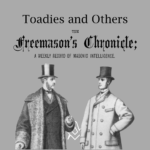 In the realm of Masonry, the principles of equality and respect are paramount. Yet, the presence of toadies—those who obsequiously seek favour from the influential—threatens these ideals. While Masonry embraces diverse beliefs and backgrounds, it rejects the sycophantic behaviours of toadies, flunkeys, and tuft-hunters, urging members to uphold genuine respect and self-worth. The Freemason's Chronicle - 22nd January 1876 |
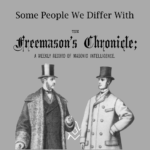 Unveiling the Unpleasant: Some People We Differ With Discover the intriguing dynamics of quarrels within the Masonic brotherhood. From the cantankerous to the litigious, the peevish to the vengeful, delve into the characters that challenge fraternal harmony. Explore their motives, temperaments, and the art of navigating disputes with these fascinating brethren. Brace yourself for a riveting journey into the world of conflicting personalities. |
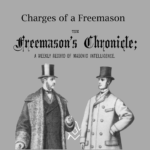 Unravelling the Masonic Mystique: A Deep Dive into the Freemasons' Charges - Explore the intricate world of Freemasonry, its principles, rituals, and the mechanisms for resolving internal disputes. Discover how this ancient fraternity fosters unity, promotes moral conduct, and upholds the sanctity of its secrets, while navigating the complexities of modern society. - The Freemason's Chronicle - 4 December 1875 |
 Unlock the hidden lessons of Masonic Studies! Don't settle for superficial knowledge or mere rituals. Discover the true depth and meaning behind Freemasonry. Expand your understanding of Tracing-Boards, Lectures, and more. Join regular Lodges of Instruction to enhance your Masonic journey. Become a knowledgeable Freemason, not just a token-bearer. Unleash the power of true Masonic wisdom today! |
 Uncover the incredible story of how Masonry saved the life of a Crimean War foot soldier in this historical and masonic account. Through the first hand experience of a soldier engaged in fierce hand-to-hand combat, witness the fateful encounter with a Russian Freemason that changed the course of his life. Learn how brotherhood and a deep dedication to the craft can lead to unforeseen and life-saving circumstances on the battlefield. |
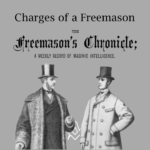 The Freemason's Chronicle - Charges of a Freemason The secrets of Masonry are the exclusive property of the Craft, and can never be communicated to one who is a mere labourer and not an accepted Mason. Hence, no labourer, that is, one who has not been regularly initiated in a legal Lodge. Article first published in The Freemason's Chronicle, 27 November 1875 |
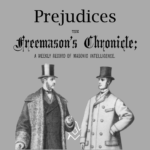 The Freemason's Chronicle - Prejudices Prejudices are partial judgments in favour of, or against certain persons or things, and, for convenience sake, may be ranged in two categories—those which are, comparatively speaking, harmless, and those which are harmful. Article first published in The Freemason's Chronicle, Oct. 2 1875. |
 The Freemason's Chronicle - Cliques Is Freemasonry - a Clique ? Man has been defined as a gregarious animal, but in his highly civilised condition he is gregarious only to a limited extent. First published in The Freemason's Chronicle, Oct. 2 1875, addresses the same challenges then as now. |
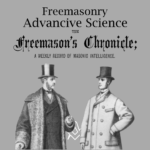 The Freemason's Chronicle - Freemasonry - an Advancive Science Is Freemasonry - an Advancive Science ? Not to confuse advancement with innovation. Has it been the case that Freemasonry's survival for 300 years plus is due to being an Advancive Science, tending to advance. First published in The Freemason's Chronicle 18 September 1875, addresses the same challenges then as now. |
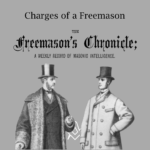 The Freemason's Chronicle - Charges Of A Freemason An interpretation of the "Charges of a Freemason", written Bro. Cornelius Moore and published in 1875, that introduce certain opinions that for some readers, will not sit well in contemporary times. - The Freemason's Chronicle, Sept. 11, 1875 |
 On The Order Of The Temple And Its Doctrine. THE Order of the Temple is divided into two great classes, denominated respectively the Order of the Temple and the Eastern Order. The Eastern Order gave birth to the Order of the Temple, and in the course of time has become an appendage of the latter. It is in ancient Egypt that we find the cradle of the Eastern Order. The Freemason's Chronicle, Sept. 4, 1875 |
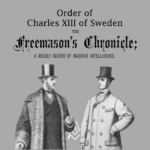 Order of Charles XIII of Sweden The following translation of the Manifesto of King JL Charles XIII of Sweden, on the occasion of his establishing the Masonic Order which bears his name, and of the Statutes of the said Order, may be interesting to our readers. The Freemason's Chronicle, Aug. 28, 1875 |
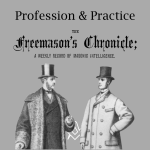 Most of our readers in the course of their experience, have doubtless met with enthusiastic brethren who take it for granted that a Mason can do no wrong. These enthusiasts are thoroughly convinced that the vast majority of those who join the Order are the most benevolent, the most moral, and the very noblest members of society. - The Freemason's Chronicle 10 July 1875 |
 An article investigating the relationship between masonry and citizenship. Are the principles of Freemasonry aligned with the freemason's claim to be a better citizen of the world? The Freemason's Chronicle - 19 June 1875 |
 A visitor must make clear his identity to the satisfaction of the Lodge he proposes to visit. More than once have we been asked to explain our views as to the reception of strangers in a Lodge. - The Freemason's Chronicle - 29 May 1875 |
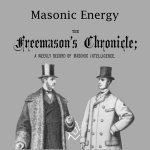 Is there reason in the accusation that Masonic energy looks only to a course of good feeds, when we can point to such grand results as have been achieved in these latter years, both in respect of the extension of our Order ? - 1May 1875 |
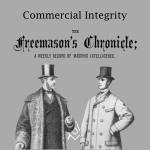 Implementing Freemasonry's peculiar system of morality in our day to day business affairs was the topic of this article, Commercial Integrity, first published in The Freemason's Chronicle - 8 May 1875 |
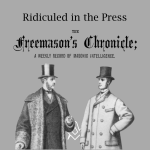 Ridicule has been somewhat illogically described as the test of truth. If it were so, Freemasonry ought to have perished long since. Two press reports from May 1875 covering the |
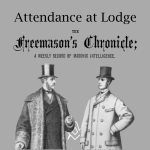 There are many things which Freemasonry will do for a man in the way of opening his mind and giving him larger and kindlier views of life, but Freemasonry itself, cannot eradicate the natural bias of the disposition. |
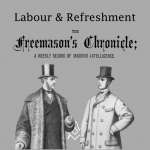 There is, we fear, too marked a tendency in very many Lodges to hasten through its labours, with a view to entering, as soon as possible, upon the business of refreshment. - The Freemason's Chronicle 17th April, 1875 |
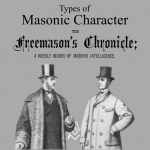 Another example that demonstrates that nothing really changes in Freemasonry. In an article the Types of Masonic Character published 145 years ago in The Freemason's Chronicle 10th April, 1875 |
 A brief history on the relationship between the British Monarchy and the craft - The Freemason's Chronicle 20th March , 1875 |
 What are the qualities of a convivial man and how does this dovetail perfectly in to Freemasonry ? 16th March, 1875 |
 A review of the "Sketch for the History of the Dionysian Artificers," a fragment, by Hyppoli to Joseph Da Costa - This little work may be regarded as, so to speak, the Holy Grail of Masonry. |
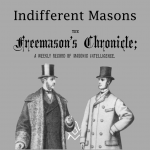 Nothing really changes, an article Indifferent Masons, From Le Monde Maçonnique 1874. Translation published in The Freemason's Chronicle 20th February, 1875 |
 In handling an intruder in the lodge, we endeavoured to show that a good Mason should be a gentleman, and a sincere man. The Freemason's Chronicle 20th February, 1875 |
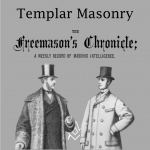 Templar Masonry - a historical aspect of the Religious and Military Order of the Temple published in The Freemason's Chronicle 13th February, 1875 |
 Secrecy perhaps the strongest objection urged by the enemies of the Masonic Order against its existence published in The Freemason's Chronicle 20th March 1875 |
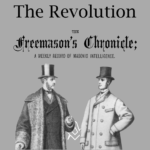 Freemasonry In The United States during And After The Revolution We take a look at Freemasonry in the United States during and after the Revolution first published in The Freemason's Chronicle - February 6, 1875 |
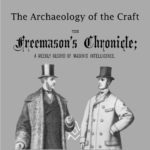 We take a look at the archaeological connection with the Craft, first published in The Freemason's Chronicle - January 30, 1875 |
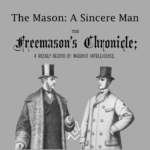 What it means to a Freemason to be a sincere man. Extract: first published in The Freemason's Chronicle - January 23, 1875 |
 What it means to a Freemason to be a citizen of the world ? First published in The Freemason's Chronicle - January 16, 1875 |
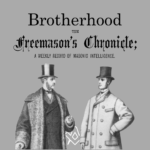 Brotherhood! In that one word what sympathetic associations arise. First published in The Freemason's Chronicle - January 9, 1875 |
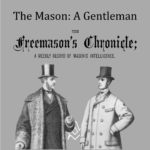 This opening article was written 145 years ago, yet it resonates with Freemasons today as it did then. First published in The Freemason's Chronicle, January 2, 1875, Issue 1 |
masonic knowledge
to be a better citizen of the world
share the square with two brothers

click image to open email app on mobile device








